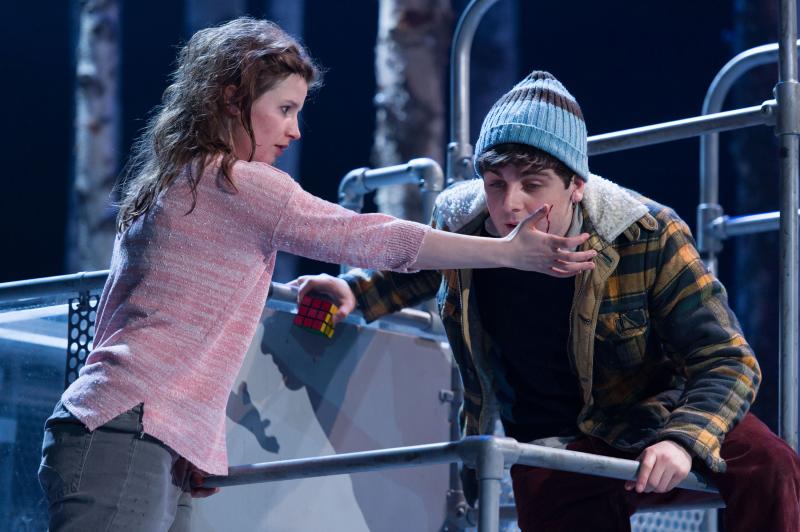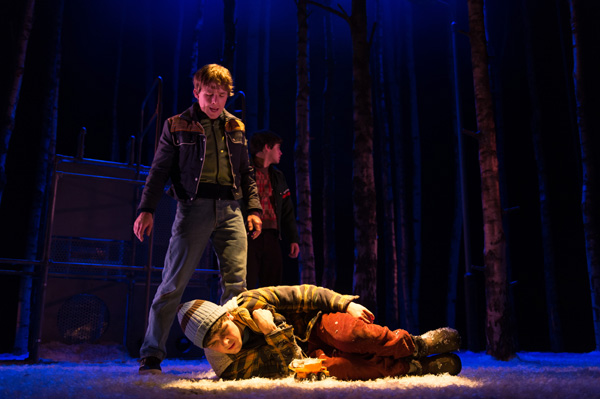Let the Right One In, Royal Court Theatre | reviews, news & interviews
Let the Right One In, Royal Court Theatre
Let the Right One In, Royal Court Theatre
Stage version of the hit vampire story is both magically theatrical and touched with sadness

Vampire romance is a genre which has a mysterious tendency. Every time it migrates from one art form (say novel) to another (say film) it loses some of its darkness and acquires a strange sweetness. So it was with Let the Right One In, a 2004 novel by Swedish penman John Ajvide Lindqvist, which was made into a slightly less dark tale in its first Swedish film version (2008) and then into an even sweeter American film adaptation as Let Me In (2010).
This is a dazzling and dramatically theatrical hit
Anyone who has seen either of the films will immediately recognise this perverse story of loneliness and friendship. Oskar, a bullied young teenage boy, hooks up with his next-door-neighbour, Eli, a child who is as old as the forest where they meet. As they awkwardly explore their friendship, we get to know them better. And we enter a mysterious but beguiling world of androgyne: is Eli female, male or something else? Is Hakan, the much older man she lives with, her father, her guardian or her lover? Or all three? Or none?
You get the picture. And it does darken. Oskar lives with his needy mother, who has a drink problem but sometimes just wants the milk of human kindness. And slips into bed with him. His father, who also has a drink problem, is absent; when, after some trouble at school, Oskar visits the old man, he sees him with a male companion. This a story where the happy chatter of suburban families is completely absent; this is a tale about other, looser connections between people.
Yet the emotional tug of the play is very strong. It is a world of random meetings, school-kid daydreams and angels, both guardian angels and avenging angels. It’s about elementally strong feelings of attraction and companionship, and about the physical pains and bodily nature of the undead: Eli, we are explicitly told, “smells like an infected bandage”. Like a pet, she needs feeding. But human blood is her only nourishment. The bonds she forms with humans thus have to be strong — it’s a matter of survival.
Figures of authority are absent, or ineffective. The kids are left pretty much on their own to cope with bullying, prejudice and their own hormonal storms. Parents are resented, or ignored. While the school teachers try to organise strength-training classes for the boys, who will look after their emotional needs? When the local policeman proves to be unable to solve a spate of terrible killings, who will protect society? Is there any cure for loneliness? In this world of sadness and isolation, it makes sense to invite the vampire in.
 This stage version has a tough magic, which means that although it dashes through the story, its atmosphere is extremely seductive, and it pauses long enough to explore some of the darker moments of the novel. Adapted by playwright Jack Thorne, this is a National Theatre of Scotland production which is blessed with a vivid theatricality and a real feeling of stage excitement. As directed by John Tiffany, the pace is exactly right and fluid scene changes never hold up the action. Although I would have preferred some more exploration of the inner worlds of the main characters, the writing is impressively efficient and clear.
This stage version has a tough magic, which means that although it dashes through the story, its atmosphere is extremely seductive, and it pauses long enough to explore some of the darker moments of the novel. Adapted by playwright Jack Thorne, this is a National Theatre of Scotland production which is blessed with a vivid theatricality and a real feeling of stage excitement. As directed by John Tiffany, the pace is exactly right and fluid scene changes never hold up the action. Although I would have preferred some more exploration of the inner worlds of the main characters, the writing is impressively efficient and clear.
Best of all is the contribution that music and movement make to the experience of watching the show. Frantic Assembly’s Steven Hoggett adds balletic dance moves while Ólafur Arnalds’s music, familiar from Broadchurch, punctuates the action. Rebecca Benson’s Eli has a magnetic stage presence, with her unearthly voice, while Martin Quinn’s Oskar is touchingly vulnerable. Similarly, Ewan Stewart’s sinister Hakan contrasts with Susan Vidler’s Mum. Graeme Dalling as the bully Jonny (pictured above right with Oskar) leads the supporting actors. With its excellent special effects and direct emotional intensity, this is a dazzling and dramatic hit.
rating
Buy
Share this article
The future of Arts Journalism
You can stop theartsdesk.com closing!
We urgently need financing to survive. Our fundraising drive has thus far raised £49,000 but we need to reach £100,000 or we will be forced to close. Please contribute here: https://gofund.me/c3f6033d
And if you can forward this information to anyone who might assist, we’d be grateful.

Subscribe to theartsdesk.com
Thank you for continuing to read our work on theartsdesk.com. For unlimited access to every article in its entirety, including our archive of more than 15,000 pieces, we're asking for £5 per month or £40 per year. We feel it's a very good deal, and hope you do too.
To take a subscription now simply click here.
And if you're looking for that extra gift for a friend or family member, why not treat them to a theartsdesk.com gift subscription?
more Theatre
 The Line of Beauty, Almeida Theatre review - the 80s revisited in theatrically ravishing form
Alan Hollinghurst novel is cunningly filleted, very finely acted
The Line of Beauty, Almeida Theatre review - the 80s revisited in theatrically ravishing form
Alan Hollinghurst novel is cunningly filleted, very finely acted
 Wendy & Peter Pan, Barbican Theatre review - mixed bag of panto and comic play, turned up to 11
The RSC adaptation is aimed at children, though all will thrill to its spectacle
Wendy & Peter Pan, Barbican Theatre review - mixed bag of panto and comic play, turned up to 11
The RSC adaptation is aimed at children, though all will thrill to its spectacle
 Hedda, Orange Tree Theatre review - a monument reimagined, perhaps even improved
Scandinavian masterpiece transplanted into a London reeling from the ravages of war
Hedda, Orange Tree Theatre review - a monument reimagined, perhaps even improved
Scandinavian masterpiece transplanted into a London reeling from the ravages of war
 The Assembled Parties, Hampstead review - a rarity, a well-made play delivered straight
Witty but poignant tribute to the strength of family ties as all around disintegrates
The Assembled Parties, Hampstead review - a rarity, a well-made play delivered straight
Witty but poignant tribute to the strength of family ties as all around disintegrates
 Mary Page Marlowe, Old Vic review - a starry portrait of a splintered life
Tracy Letts's Off Broadway play makes a shimmeringly powerful London debut
Mary Page Marlowe, Old Vic review - a starry portrait of a splintered life
Tracy Letts's Off Broadway play makes a shimmeringly powerful London debut
 Little Brother, Soho Theatre review - light, bright but emotionally true
This Verity Bargate Award-winning dramedy is entertaining as well as thought provoking
Little Brother, Soho Theatre review - light, bright but emotionally true
This Verity Bargate Award-winning dramedy is entertaining as well as thought provoking
 The Unbelievers, Royal Court Theatre - grimly compelling, powerfully performed
Nick Payne's new play is amongst his best
The Unbelievers, Royal Court Theatre - grimly compelling, powerfully performed
Nick Payne's new play is amongst his best
 The Maids, Donmar Warehouse review - vibrant cast lost in a spectacular-looking fever dream
Kip Williams revises Genet, with little gained in the update except eye-popping visuals
The Maids, Donmar Warehouse review - vibrant cast lost in a spectacular-looking fever dream
Kip Williams revises Genet, with little gained in the update except eye-popping visuals
 Ragdoll, Jermyn Street Theatre review - compelling and emotionally truthful
Katherine Moar returns with a Patty Hearst-inspired follow up to her debut hit 'Farm Hall'
Ragdoll, Jermyn Street Theatre review - compelling and emotionally truthful
Katherine Moar returns with a Patty Hearst-inspired follow up to her debut hit 'Farm Hall'
 Troilus and Cressida, Globe Theatre review - a 'problem play' with added problems
Raucous and carnivalesque, but also ugly and incomprehensible
Troilus and Cressida, Globe Theatre review - a 'problem play' with added problems
Raucous and carnivalesque, but also ugly and incomprehensible
 Clarkston, Trafalgar Theatre review - two lads on a road to nowhere
Netflix star, Joe Locke, is the selling point of a production that needs one
Clarkston, Trafalgar Theatre review - two lads on a road to nowhere
Netflix star, Joe Locke, is the selling point of a production that needs one
 Ghost Stories, Peacock Theatre review - spirited staging but short on scares
Impressive spectacle saves an ageing show in an unsuitable venue
Ghost Stories, Peacock Theatre review - spirited staging but short on scares
Impressive spectacle saves an ageing show in an unsuitable venue

Add comment